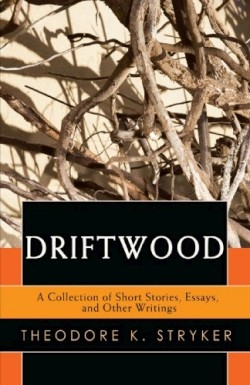It looks like you've stumbled upon a page meant to be read by our code instead of viewed directly. You're probably looking for this page.
Driftwood
A Collection of Short Stories, Essays, and Other Writings
Hybrids can be useful—mules work harder and are smarter than horses. And hybrids can be entertaining—the very name “Goldendoodle” inspires a smile. Theodore Stryker’s Driftwood is a hybrid that is entertaining and no doubt useful for those who know the man, the era, or the places he has been. Driftwood is a heartfelt collection of fifteen short stories and twelve essays. The short stories are grouped in a section called “Chicken Soup,” and the essays are divided between “Things That Must Be Said” and “From the Attic.”
This peculiar arrangement of material makes for a curious book. The short stories are in fact fictionalized elements of the Stryker’s life. His bio notes, “With little exception, they accurately record events in his life.” So why not write a straightforward memoir? Stryker doesn’t say.
In both his fiction and nonfiction, the author expresses relatively liberal humanist social and political positions, although several of the essays express arguments against affirmative action and for stringent enforcement of immigration laws, and tepid recognition of the benefits of feminism (“The results have been mixed at best”).
The short stories are written in a relaxed point of view and do not attempt to dazzle with literary pretensions. Some cover Stryer’s early life in northern California. Others deal with the narrator’s military life and subsequent civil service career. But the most passionate and intriguing of these reflect his fascination with Japan, its culture, and its people.
Stryker served in Japan while in the military. He attended university there and married a Japanese woman. His writing in a long chapter titled “Japan Revisited” shows both personal insight and an appreciation of the nation and its people.
The author perceives Japan as a land and people of “simplicity and serenity.” But Stryker is a realist who recognizes the sins of Imperial Japan. He contends that the decision to use atomic weapons at Hiroshima and Nagasaki was “correct” and might be considered “humane” in some measure. “It saved not only thousands of American lives, but a great many more Japanese lives, as well. I saw the wartime bunkers and fortifications scattered over the hillsides,” he writes.
Driftwood may not appeal to every reader, but those interested in history and how a thoughtful man perceived the second half of the twentieth century, might find it provides an interesting interlude.
Disclosure: This article is not an endorsement, but a review. The publisher of this book provided free copies of the book and paid a small fee to have their book reviewed by a professional reviewer. Foreword Reviews and Clarion Reviews make no guarantee that the publisher will receive a positive review. Foreword Magazine, Inc. is disclosing this in accordance with the Federal Trade Commission’s 16 CFR, Part 255.
